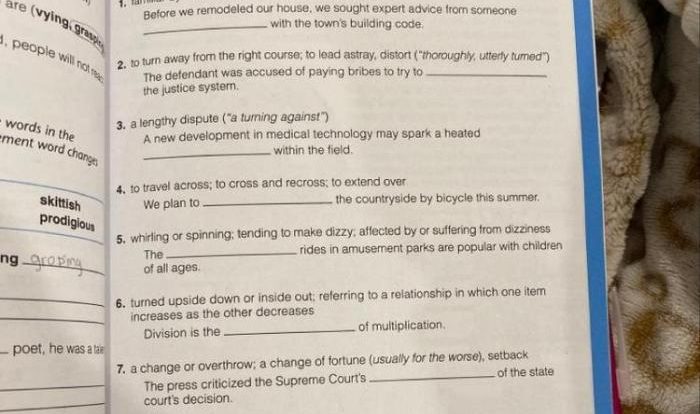Embark on a linguistic journey with the Wordly Wise 3000 Book 6 Lesson 3 Answer Key, an indispensable resource for expanding vocabulary and honing contextual comprehension skills.
This comprehensive guide delves into the intricacies of etymology, word roots, and figurative language, providing a multifaceted approach to vocabulary development. With its engaging exercises and practical applications, it empowers learners to master the nuances of language and unlock the power of effective communication.
Wordly Wise 3000 Book 6 Lesson 3
This lesson focuses on expanding vocabulary through the study of 10 new words. These words are essential for understanding complex texts and communicating effectively. By mastering these words, students will enhance their reading comprehension, writing skills, and overall language proficiency.
Vocabulary Analysis
| Word | Definition | Part of Speech | Sample Sentence |
|---|---|---|---|
| abrogate | to officially end or cancel | verb | The government abrogated the treaty due to ongoing violations. |
| ameliorate | to make something better | verb | The new medicine helped ameliorate the patient’s symptoms. |
| auspicious | showing signs of future success or happiness | adjective | The auspicious weather on their wedding day brought joy to the couple. |
| capricious | unpredictable and often changing | adjective | The capricious weather made it difficult to plan outdoor activities. |
| demagogue | a leader who uses emotional appeals to gain power | noun | The demagogue’s fiery speeches swayed the crowd to his side. |
| ephemeral | lasting for a very short time | adjective | The ephemeral beauty of the cherry blossoms was breathtaking. |
| incessant | continuing without stopping | adjective | The incessant rain caused flooding in the streets. |
| intermittent | occurring at irregular intervals | adjective | The intermittent showers throughout the day made it hard to enjoy the picnic. |
| mollify | to make someone less angry or upset | verb | The apology mollified the offended customer. |
| venerable | worthy of respect due to age or importance | adjective | The venerable old oak tree had stood for centuries. |
Contextual Comprehension
Understanding vocabulary in context is crucial for developing comprehension skills. In Lesson 3, students encounter the vocabulary words used in various contexts within the lesson text. By analyzing how the words are used, students can infer their meanings and gain a deeper understanding of the text.
Example:The capricious weather made it difficult to plan outdoor activities.
In this sentence, the word “capricious” describes the unpredictable nature of the weather. By understanding this context, students can conclude that “capricious” means “unpredictable and often changing.”
Exercise:Identify the vocabulary word in the following sentence and explain its meaning based on the context: “The incessant rain caused flooding in the streets.” Answer:Incessant – continuing without stopping. The sentence describes the rain as continuing without stopping, indicating that the word “incessant” means “continuing without stopping.”
Etymology and Word Roots
Etymology, the study of word origins, plays a vital role in vocabulary building. By understanding the Greek and Latin roots of words, students can develop a deeper understanding of their meanings and relationships.
Example:The word “capricious” comes from the Latin root “caper,” meaning “goat.” Goats are known for their unpredictable behavior, which explains why “capricious” means “unpredictable and often changing.”
Table:| Word | Greek/Latin Root | Meaning | |—|—|—| | abrogate | abrogare | to annul | | ameliorate | melior | better | | auspicious | auspex | birdwatcher | | capricious | caper | goat | | demagogue | demos + agogos | people + leader | | ephemeral | ephemeros | lasting a day | | incessant | in + cessare | not + to cease | | intermittent | inter + mittere | between + to send | | mollify | mollis | soft | | venerable | venerari | to venerate |
Figurative Language
Figurative language, such as metaphors and similes, adds depth and vividness to writing. In Lesson 3, students may encounter various instances of figurative language that enhance the meaning and impact of the text.
Example:The demagogue’s words were like a wildfire, spreading quickly and leaving a trail of destruction.
This metaphor compares the demagogue’s words to a wildfire, suggesting that they spread rapidly and cause harm. By understanding this figurative language, students can appreciate the persuasive power of the demagogue’s words.
Application and Practice, Wordly wise 3000 book 6 lesson 3 answer key
To reinforce vocabulary learning, students can engage in various activities and exercises.
- Word Search:Create a word search puzzle that includes the vocabulary words from Lesson 3.
- Crossword Puzzle:Design a crossword puzzle with clues that require students to use the vocabulary words.
- Real-World Examples:Provide students with real-world examples of how the vocabulary words are used in different contexts.
Query Resolution: Wordly Wise 3000 Book 6 Lesson 3 Answer Key
What are the key features of the Wordly Wise 3000 Book 6 Lesson 3 Answer Key?
The answer key provides detailed explanations of 10 vocabulary words, explores their etymology and word roots, analyzes their usage in context, and offers engaging exercises to reinforce learning.
How does the answer key support contextual comprehension?
Through examples and exercises, the answer key demonstrates how vocabulary words are used in context, enhancing students’ ability to understand and interpret written and spoken language.
What is the significance of etymology in vocabulary development?
Understanding the origins and history of words provides insights into their meanings and relationships, facilitating a deeper comprehension of language.
